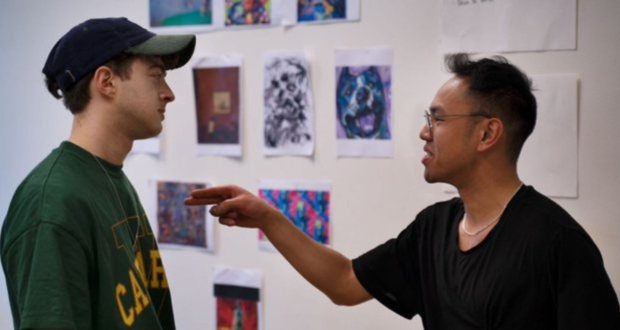Though it needs a longer run to allow its good ideas to settle, this new version set in British secondary schools features three superb performances and some clever characterisations.Summary
Rating
Good
Has Two Gentlemen of Verona, Shakespeare’s immature play about immaturity, become unproducible? The millstone around the drama-comedy’s neck has always been its unsettling ending: not only is an attempted rapist forgiven by the victim’s fiancé in front of the victim herself, but Shakespeare keeps the victim mute for the remainder of the evening. Evan L Barker’s new production at Barons Court Theatre, with a cast of young actors of varying quality, takes aim at this ending. His staging has interesting (if not yet fully realised) ideas, and its more-than-occasional lack of narrative clarity is buoyed by a joyful, hurtling energy and three strong central performances.
In Barker’s conception, the original settings of the play are replaced by modern-day British secondary schools: Verona is now a state school, Milan is private, and the wild forest outside Mantua is a juvenile detention centre. It’s a terrific conceit; much of the impulsive behavior in the play rings truer with teenagers. It promises an exploration of class and criminality in contemporary youth, and begins encouragingly: kids in school uniforms singing ‘Jerusalem’ with hilarious disinterest, love notes passed in class, and a school caretaker sweeping the floor in a crudely (and cleverly) graffitied uniform.
But, overall, the concept feels undeveloped. Had I not known the play, I would not have clocked the move to the private school: costuming doesn’t change, nor is much made of our two male protagonists’ acclimation to their new environment. Shakespeare’s most pointed class commentary comes in the form of Thurio, Valentine’s rich, daffy competitor. Turning Thurio into a sullen goth of no obvious privilege (despite Izzi McCormack-John’s sly take) feels like a missed opportunity for some classroom class warfare. More disappointing are the juvy inmates taking the place of the band of thieves who, in Shakespeare’s telling, are secretly upstanding gentlemen (a kind of proto-Pirates of Penzance). Here they are merely menacing, huffing nitrous and absent of any humanising desire for redemption.
The show has three excellent performances: Hugo Papiernik’s gentle and earnest Valentine (pining over a hair scrunchy), Harry Rose’s funny, haunting Lance, and, especially, Tor Leijten’s Julia. Leijten is a serious young talent. She is charismatic and clear, able to broadcast complex feelings with a glance. The stage is most alive in her scenes with sleepover buddy Lucetta (again, a very funny McCormack-John, vaping in fuzzy slippers). Leijten’s delightful exploration of ‘boy-ness’ as she disguises herself as a page made me eager to see her Rosalind.
Papiernik, with his delicate, camera-ready face and utter naturalness, finds the right temperature for every scene. His calm confidence steadies his scene partners, especially the appealing, high-octane Alun Ross as Speed. Kudos to Lucas Taylor, playing the father of two actors who are clearly as old or older than him and pulling it off with gravitas.
Barker’s weakest conception is in Proteus, the play’s central destructive force. Proteus begins the play as an ardent lover and friend, but instantly transfers his passion from one woman to another, has his friend banished, and commits sexual assault. Paul Surel is a smart performer, but he and Barker seem to have no interest in the play’s rehabilitation of Proteus and thus imbue him with nothing deeper than villainy.
Barker clearly believes that Shakespeare’s ending is not just unplayable but toxic (he’s probably right). The solution here is some defiantly unpoetic – if cathartic – wish fulfillment. Sonnet 104, a meditation on how love can blind one to changes in their beloved, closes the evening. The sonnet is relevant, but the busy transition to the final tableau distracted me from Rose’s soulful delivery.
The show deserves a longer run to find its footing, smooth out some roughness (especially, one hopes, a reconsideration of underscoring during monologues) and deepen its good ideas. Papiernik, Rose, and Leitjen are more than worth the price of admission.
Produced by BO15 Productions Ltd alongside The Messy Kind Collective
Written by William Shakespeare
Directed by Evan L Barker
This run is now complete.
 Everything Theatre Reviews, interviews and news for theatre lovers, London and beyond
Everything Theatre Reviews, interviews and news for theatre lovers, London and beyond



